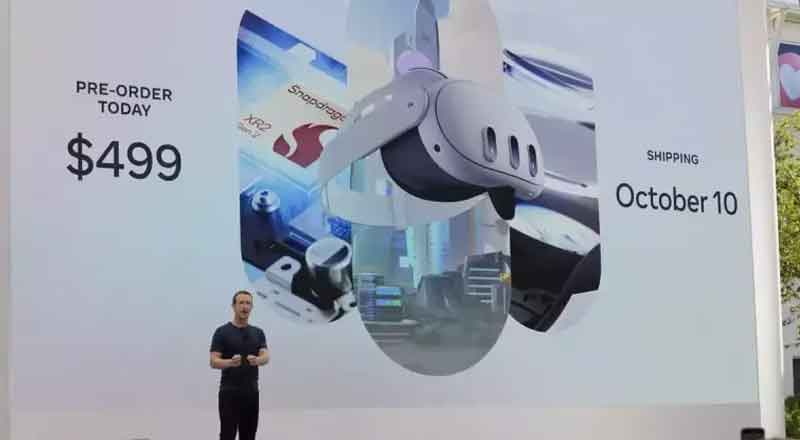Meta Platforms Chief Executive Mark Zuckerberg rolled out new AI products for consumers, including bots that create photo-realistic images and smart glasses that answer questions, as well as an updated virtual-reality headset.
Zuckerberg described the products as bringing together virtual and real worlds, and underscored that part of what Meta offered was low-cost or free AI that could integrate into the daily routine. Meta’s Quest is the bestseller in the nascent VR space and the company’s executives described it as the best value in the industry, a nod to the impending release of a much more expensive headset from Apple.
Zuckerberg said a new generation of Meta’s Ray-Ban smart glasses would start shipping on Oct. 17, priced at $299. The device will incorporate a new Meta AI assistant and be capable of live streaming broadcasts of what a user is seeing directly to Facebook and Instagram, an advancement over the previous generation’s ability to snap photos.
Zuckerberg said the latest Quest mixed-reality headset would start shipping on Oct. 10 and introduced the company’s first consumer-facing generative AI products. The latter includes a chatbot called Meta AI that can generate both text responses and photo-realistic images.
Meta AI will be built into the smart glasses as an assistant, starting with a beta rollout in the United States. A software update planned for next year will give the assistant the ability to identify places and objects that people are seeing, as well as to perform language translation.
Meta made Meta AI using a custom model based on the powerful Llama 2 large language model that the company released for public commercial use in July. The chatbot will have access to real-time information via a partnership with Microsoft’s (MSFT.O) Bing search engine, Zuckerberg said.
Meta also announced that it was building a platform that developers and ordinary people alike may use to create custom AI bots of their own, which will have profiles on Instagram and Facebook and eventually appear as avatars in the metaverse. The features appeared to be aimed at sprucing up existing apps and devices rather than developing new ad surfaces or other sources of revenue.
Zuckerberg also said on Wednesday that Xbox cloud gaming is coming to Quest in December. Meta first announced the Quest 3 headset over the summer, around the time Apple debuted its Vision Pro headset, a high-end product with a price of $3,500.
Starting at $500, the Quest 3 boasts the same mixed-reality technology that premiered in Meta’s more expensive Quest Pro device launched last year, which shows wearers a video feed of the real world around them. The day’s announcements reflect how Zuckerberg plans to navigate the shift this year of investor fervor to artificial intelligence from augmented and virtual reality technologies.
Stakes for the event were high as investors last year slammed the parent company of Facebook and Instagram for spending extensively on the metaverse, prompting Zuckerberg to lay off tens of thousands of staff to continue funding his vision.
Developers were watching to assess what apps they might create for Meta’s latest hardware devices. Investors, meanwhile, looked for signs of whether a gamble that has lost the company more than $40 billion since 2021 may pay off.
(With inputs from agencies)





